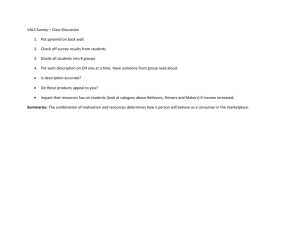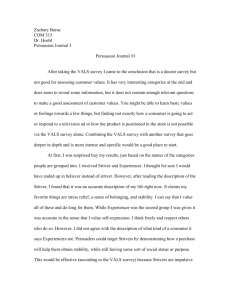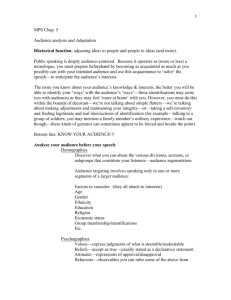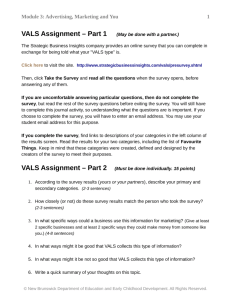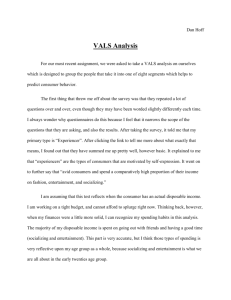VALS Framework - Mr. George Academics
advertisement
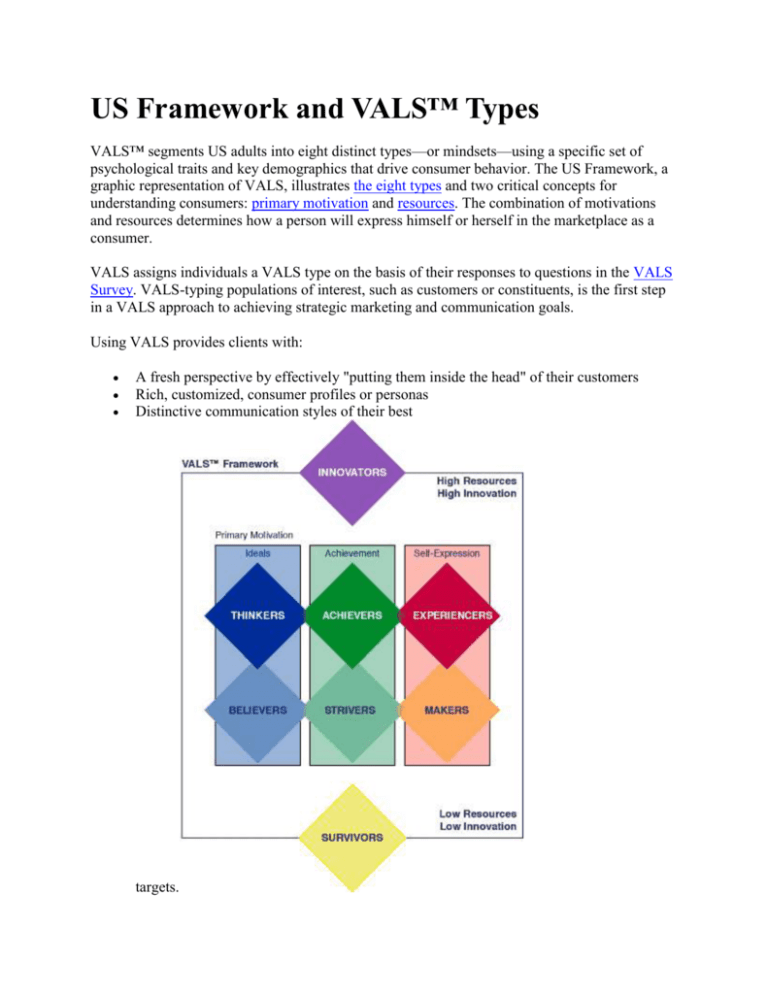
US Framework and VALS™ Types VALS™ segments US adults into eight distinct types—or mindsets—using a specific set of psychological traits and key demographics that drive consumer behavior. The US Framework, a graphic representation of VALS, illustrates the eight types and two critical concepts for understanding consumers: primary motivation and resources. The combination of motivations and resources determines how a person will express himself or herself in the marketplace as a consumer. VALS assigns individuals a VALS type on the basis of their responses to questions in the VALS Survey. VALS-typing populations of interest, such as customers or constituents, is the first step in a VALS approach to achieving strategic marketing and communication goals. Using VALS provides clients with: A fresh perspective by effectively "putting them inside the head" of their customers Rich, customized, consumer profiles or personas Distinctive communication styles of their best targets. (If you would like to use the VALS™ Framework in your book or other publication, you must first request permission to reprint VALS™ information.) The VALS™ Types: Innovators Thinkers Believers Achievers Strivers Experiencers Makers Survivors Sample Demographics and Behaviors Primary Motivation: Ideals, Achievement, and SelfExpression The concept of primary motivation explains consumer attitudes and anticipates behavior. VALS includes three primary motivations that matter for understanding consumer behavior: ideals, achievement, and self-expression. Consumers who are primarily motivated by ideals are guided by knowledge and principles. Consumers who are primarily motivated by achievement look for products and services that demonstrate success to their peers. Consumers who are primarily motivated by self-expression desire social or physical activity, variety, and risk. These motivations provide the necessary basis for communication with the VALS types and for a variety of strategic applications. Resources A person's tendency to consume goods and services extends beyond age, income, and education. Energy, self-confidence, intellectualism, novelty seeking, innovativeness, impulsiveness, leadership, and vanity play a critical role. These psychological traits in conjunction with key demographics determine an individual's resources. Various levels of resources enhance or constrain a person's expression of his or her primary motivation. Innovators are successful, sophisticated, take-charge people with high self-esteem. Because they have such abundant resources, they exhibit all three primary motivations in varying degrees. They are change leaders and are the most receptive to new ideas and technologies. Innovators are very active consumers, and their purchases reflect cultivated tastes for upscale, niche products and services. Image is important to Innovators, not as evidence of status or power but as an expression of their taste, independence, and personality. Innovators are among the established and emerging leaders in business and government, yet they continue to seek challenges. Their lives are characterized by variety. Their possessions and recreation reflect a cultivated taste for the finer things in life. Favorite Things: BMW Wired sparkling water a rewarding experience Thinkers are motivated by ideals. They are mature, satisfied, comfortable, and reflective people who value order, knowledge, and responsibility. They tend to be well educated and actively seek out information in the decision-making process. They are well-informed about world and national events and are alert to opportunities to broaden their knowledge. Thinkers have a moderate respect for institutions of authority and social decorum but are open to consider new ideas. Although their incomes allow them many choices, Thinkers are conservative, practical consumers; they look for durability, functionality, and value in the products that they buy. Favorite Things: Subaru Kiplinger's Personal Finance a glass of wine a substantive discussion Motivated by the desire for achievement, Achievers have goal-oriented lifestyles and a deep commitment to career and family. Their social lives reflect this focus and are structured around family, their place of worship, and work. Achievers live conventional lives, are politically conservative, and respect authority and the status quo. They value consensus, predictability, and stability over risk, intimacy, and self-discovery. With many wants and needs, Achievers are active in the consumer marketplace. Image is important to Achievers; they favor established, prestige products and services that demonstrate success to their peers. Because of their busy lives, they are often interested in a variety of time-saving devices. Favorite Things: Honda Every Day with Rachael Ray low-calorie domestic beer recognition at work Experiencers are motivated by self-expression. Young, enthusiastic, and impulsive consumers, Experiencers quickly become enthusiastic about new possibilities but are equally quick to cool. They seek variety and excitement, savoring the new, the offbeat, and the risky. Their energy finds an outlet in exercise, sports, outdoor recreation, and social activities. Experiencers are avid consumers and spend a comparatively high proportion of their income on fashion, entertainment, and socializing. Their purchases reflect the emphasis that they place on looking good and having "cool" stuff. Favorite Things: VW Rolling Stone Red Bull to be entertained Like Thinkers, Believers are motivated by ideals. They are conservative, conventional people with concrete beliefs based on traditional, established codes: family, religion, community, and the nation. Many Believers express moral codes that have deep roots and literal interpretation. They follow established routines, organized in large part around home, family, community, and social or religious organizations to which they belong. As consumers, Believers are predictable; they choose familiar products and established brands. They favor U.S. products and are generally loyal customers. Favorite Things: Mercury Cooking with Paula Deen local TV news a close-knit family Strivers are trendy and fun loving. Because they are motivated by achievement, Strivers are concerned about the opinions and approval of others. Money defines success for Strivers, who don't have enough of it to meet their desires. They favor stylish products that emulate the purchases of people with greater material wealth. Many Strivers see themselves as having a job rather than a career, and a lack of skills and focus often prevents them from moving ahead. Strivers are active consumers because shopping is both a social activity and an opportunity to demonstrate to peers their ability to buy. As consumers, they are as impulsive as their financial circumstance will allow. Favorite Things: Chevrolet Playboy Coke Classic win the lottery Like Experiencers, Makers are motivated by selfexpression. They express themselves and experience the world by working on it—building a house, raising children, fixing a car, or canning vegetables—and have enough skill and energy to carry out their projects successfully. Makers are practical people who have constructive skills and value self-sufficiency. They live within a traditional context of family, practical work, and physical recreation and have little interest in what lies outside that context. Makers are suspicious of new ideas and large institutions such as big business. They are respectful of government authority and organized labor but resentful of government intrusion on individual rights. They are unimpressed by material possessions other than those with a practical or functional purpose. Because they prefer value to luxury, they buy basic products. Favorite Things: Dodge Ram Field & Stream Budweiser NASCAR Survivors live narrowly focused lives. Because they have few resources with which to cope, they often believe that the world is changing too quickly. They are comfortable with the familiar and are primarily concerned with safety and security. Because they must focus on meeting needs rather than fulfilling desires, Survivors do not show a strong primary motivation. Survivors are cautious consumers. They represent a very modest market for most products and services. They are loyal to favorite brands, especially if they can purchase them at a discount. Favorite Things: an American car AARP Magazine The 700 Club a home-brewed cup of coffee
